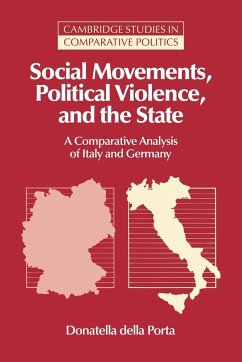This book presents empirical research on the nature and structure of political violence. While most studies of social movements focus on single-nation studies, Donatella della Porta uses a comparative research design to analyze movements in two countries - Italy and Germany - from the 1960s to the 1990s. Through extensive use of official documents and in-depth interviews, della Porta explains the actors' construction of external political reality. The empirical data are used to build a middle-range theory on political violence that incorporates an analysis of the interactions between social movements and the state at the macro-level, an analysis of the development of radical organizations as entrepreneurs for political violence at the meso-level, and an analysis of the construction of "militant" identities and countercultures at the micro-level. By studying the social movement families from within which violence emerges, linking social movements to institutions, and, finally, providing a systematic analysis - firmly grounded in history - of the nature of political violence, the author has created a masterful synthesis that will help secure a place for the study of political violence in the study of systemwide politics.








